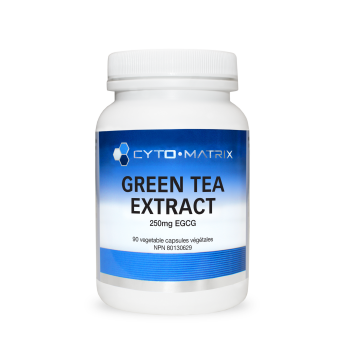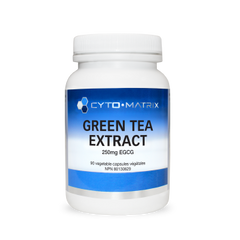



Description
x- 500 mg of green tea extract per capsule, providing 250 mg of EGCG with minimal caffeine content, to support metabolic function, athletic performance, cognition, skin health and healthy cell differentiation.
- 500 mg of green tea extract per capsule, standardized to ensure that 250 mg (50%) is provided as EGCG and an additional 150 mg (30%) as other catechins.
- Indicated to support metabolic function, athletic performance, cognition, skin health and healthy cell differentiation.
- Natural caffeine is reduced to 0.5%, or 2.5 mg per capsule, for people sensitive to its stimulating effects.
Green tea is one of the most consumed teas in the world. While it is a staple of many cultural engagements, its popularity is also due to the health benefits associated with its consumption and supplementation with concentrated green tea extracts (GTE). Most research focuses on epigallocatechin gallate (EGCG), with this catechin considered the primary antioxidant responsible for protecting cells from oxidative damage, while also providing a wide range of health benefits. For example, GTE and EGCG have been studied to help combat skin aging and acne, perhaps through their favorable effects on healthy cell differentiation and the balance between cell production and death.
One of the most popular indications for green tea supplementation is for metabolic function and weight management. For starters, catechins and caffeine have been shown to promote thermogenesis, which is the process of burning calories to produce heat. A synergistic effect between these two ingredients may explain some research that green tea extract promotes weight loss. Most importantly, green tea extract has been shown to increase insulin sensitivity, decrease hemoglobin A1C, improve blood sugar tolerance, and reduce fasting blood sugar, all of which supports metabolic health and may contribute to weight loss goals. Additionally, the antioxidants in GTE have been shown to reduce C-reactive protein, help reduce blood pressure, and inhibit fat absorption into cells.
These collective actions may partly explain why GTE was found to further reduce exercise-induced changes in weight, body mass index, waist-to-hip ratio, and body fat percentage.
Regarding physical exercise, GTE could improve performance and recovery times by counteracting oxidative stress and cellular damage caused by physical activity. One study showed that green tea catechins reduced cell damage, delayed muscle fatigue, and improved recovery in trained athletes after undergoing repeated exercises designed to induce cumulative fatigue. Taking this theory further, another study showed that 14 men who engaged in active physical activity and consumed green tea extract for 4 weeks increased their running distance by 10.9%.
Finally, GTE appears capable of supporting cognition. GTE, and particularly EGCG, has been shown to improve the connection between different parts of the brain and protect brain cells from oxidative stress, which can slow mental decline. A 2014 study showed that 12 people consuming high daily doses of EGCG experienced increased brain function and improved task performance compared to a placebo group. Some evidence suggests that green tea may also decrease the action of heavy metals like iron and copper, both of which can damage brain cells.
Posologie
xInfos nutritionnelles
x- Choosing a selection results in a full page refresh.

